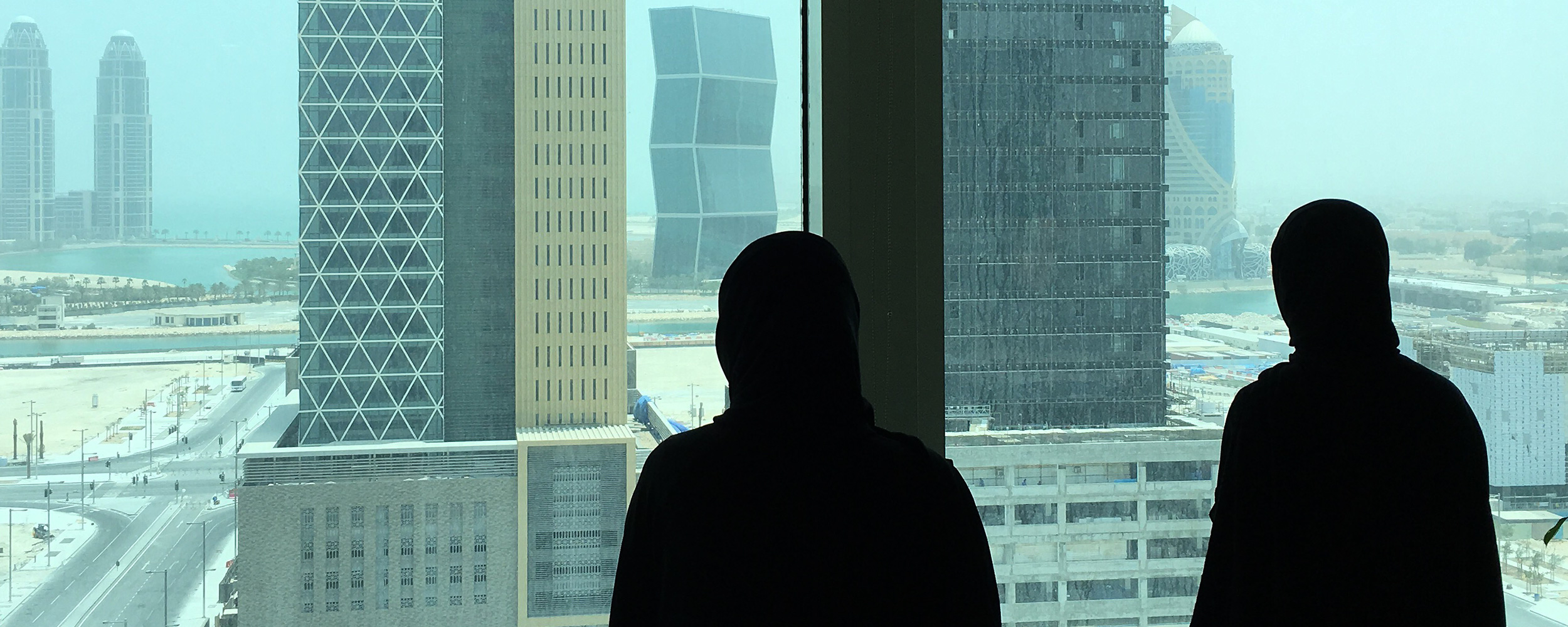 3
Issue 3
3
Issue 3

Qatar University students looking out at Lusail City and the Pearl, Doha. Photo: Dr. Anna Grichting
Sustainable Urbanism – New Directions Workshop: Introduction
The international workshop programme Sustainable Urbanism: New Directions curated and staged by Qatar University in March 2016 brought together leading experts and researchers from around the world to discuss new directions in sustainable urbanism from the perspectives of the social sciences, but also with an emphasis on its interdisciplinary nature.
A truly sustainable urbanism today cannot only engage with a mix of smart city technologies applied to urban design in a formal sense and ecological infrastructure. Sustainable urbanism is also fundamentally about people and communities, and their major participative role in shaping and managing the built environment.
New paradigms for sustainable urbanism are emerging that have the capacity to deeply influence the health of the city and the planet, including urban biodiversity, food urbanism, water-sensitive urban design, systems thinking in urban planning and ecological urbanism. While much knowledge, and many tools and technologies, have been created of late to construct sustainable cities, in many cases we are still lacking a holistic and integrated approach to urban design that includes all biological species, human communities and urban systems – transportation, water, solid waste, air quality.
The Sustainable Urbanism: New Directions workshop programme showcases experts and researchers recognised in these emerging fields at the cutting edge of sustainable urbanism. Their knowledge contributed valuably sustains the creation of new directions in socially and physically sustainable cities.
Dr. Michael Reksulak
Director, Social Sciences, Arts & Humanities, Qatar University
The Conference and Workshop Sponsorship Program is an important part of Qatar National Research Fund’s portfolio of research grants. One of its goals is to promote national, regional and international collaborations on topics that address Qatar’s needs and have the potential for a positive impact on Qatar’s society. What makes this programme of workshops, Sustainable Urbanism: New Directions, so attractive to the Qatar National Research Fund (QNRF) is its inherent interdisciplinary nature that ranges from the social sciences and health, to engineering and environment as well as computer science. Moreover, how to ensure that large urban projects deliver long-term benefits to Qatar is one of the grand challenges identified under the Qatar National Research Strategy (QNRS).
Dr. Khalifa Al Khalifa
Dean, College of Engineering, Qatar University
This is a timely event that paves the way for dialogue on a topic that is of interest to the industry and to society. It also engages the community to find various methods and procedures for shaping and managing the built environment. CENG (College of Engineering, Qatar University) is well place to lead this important event that engages thought provoking discussions on new paradigms in sustainable urbanism, and are of invaluable benefit to specialists, researchers and policy makers on city management and urban planning. This underlines Qatar University’s commitment to being a key partner in contributing to the goals of Qatar National Vision and the development strategies.
Dr. Yasser Mahgoub
Head of the Department of Architecture and Urban Planning, College of Engineering, Qatar University
The Department of Architecture and Urban Planning, College of Engineering, Qatar University, is honoured to have had the opportunity to organise in March 2016 the important workshop programme entitled Sustainable Urbanism: New Directions, which received the kind support of the Qatar National Research Fund and the Embassy of Switzerland in Qatar.
In his masterpiece, Almuqadimah, the 14th-century great philosopher of history and the founder of the science of “lm al-ʿUmran”, Ibn Khaldun stated that ‘Ilm al- ‘umran, the science of urbanism, is an independent science. This science has its own peculiar object – that is, human civilization and social organization. The discussion of this topic is extraordinary, and highly useful. Penetrating research has shown the way to it.’ Ibn Khaldun conceived the city as the locus of civilization. His ideas and observations encompassed society, culture, socialization, social control, the state, asabiyah (private and public social solidarity) history as a cyclical movement, urbanization, and the typology of badawa (primitive life) and hadara (civilized life or urbanism). They also preceded those of Machiavelli, Vico, and Turgot, as well as those of Montesqueau, Comte, Durkheim, Spengler, Tonnies, and even Marx.
The current world population is 7.4 billion and is expected to rise to reach 9 billion in the year 2040. This continuing growth will increase the need to investigate our current actions and future directions. Sustainable urbanism is a worldwide challenge that is required to be addressed by all disciplines and experts. Global competition, exploitation of resources and rapid urbanization will affect our ability to live in the near future.
Climate change is another threat to our available environmental ecosystems. Another threat is the loss of biodiversity that impacts our essential ecological functions. A paradigm shift has occurred by adopting sustainability as the theoretical concept for responsible stewardship of biological diversity for our future generations. Sustainable Urbanism: New Directions offers an approach that builds on our past experiences and complex relationship with nature and land management. Sustainable Urbanism: New Directions provides a roadmap to urban resilience, the capability to prepare for, respond to, and recover from significant multi-hazard threats with minimum damage to public safety and health, the economy, and security.